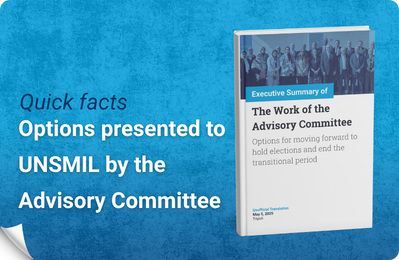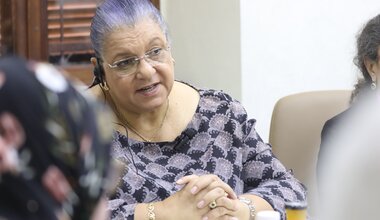Statement by SRSG for Libya and Head of UNSMIL to the Security Council - 5 November 2015
(As Delivered)
Mr. President, Distinguished Members of the Council,
1. Since the High Level Meeting on Libya which took place on the margins of the General Assembly on 2 October, UNSMIL convened what should have been a final round of talks in Skhirat, Morocco to facilitate Libyan deliberations on the composition of the Presidency Council that would lead the country's future Government of National Accord.
2. After four days of intensive consultations which concluded on 8 October, members of the Libyan political dialogue process succeeded in forging consensus on a list of six nominees, including a Prime Minister designate, three deputy Prime Ministers, and two Senior Ministers.
3. The proposed composition of the Presidency Council was seen as a means of securing the necessary consensus and inclusivity that would allow for a Government of National Accord to assume office with the requisite support and backing of all relevant political and security stakeholders, as well as the Libyan public at large.
4. While the proposal was hailed as a major breakthrough in the dialogue process, strong objections were voiced in some quarters, notably from within the House of Representatives, for what was perceived as inadequate representation for the east, particularly Benghazi.
5. In the three weeks that followed the announcement of the proposed composition of the Presidency Council, the United Nations has consulted closely with parties from across the political spectrum in an effort to resolve outstanding concerns regarding representation. In this regard, there appears to be growing support to the idea of expanding the Presidency Council as a means of consolidating and safeguarding Libya's historical traditions of geographical and regional balance and representation.
6. Despite the passing of the 21 October constitutional timeline by which we had hoped that a final political settlement would be agreed and endorsed by the main political stakeholders, there is yet to be a formal and final pronouncement by either of the main political stakeholders on the Libyan Political Agreement and the proposed Presidency Council.
7. Working closely with representatives of the international community, the United Nations Support Mission in Libya continued to impress upon both the Libyan House of Representatives and the Tripoli-based General National Congress the need to urgently convene sessions that would allow for a democratic vote on the Political Agreement and proposals for the Presidency Council.
Mr. President,
8. From the moment of its inception, the United Nations facilitated Libyan political dialogue process has always been predicated on the assumption that it would be inclusive of all parties, and that any solution put forward would have to be viable and comprehensive such that it brings to an end the bitter political institutional divide that has been at the heart of the conflict which has brought much destruction and suffering to Libya and its people.
9. While I have always remained hopeful about the chances of Libya's leaders reaching a peaceful agreement, I have had no illusions about the difficulties and challenges that would likely face the political dialogue process.
10. As I have noted on a number of occasions before this Council, there can be no viable peace in Libya without the constructive engagement and buy-in of all the parties. Forging a meaningful consensus and arriving at a balanced political agreement was likely to be a protracted and difficult process. Success would always be dependent on the parties' collective endorsement of an agreement. Likewise, Libyan ownership of the dialogue process and of its outcomes has been at the heart of the United Nations mediation efforts. This is a principle that is simply non-negotiable.
11. But the magnitude of the dangers facing Libya should also not be underestimated. This is a message that I continue to reiterate to all the parties in Libya, including to the leaderships of both the House of Representatives and the General National Congress. The country's economy and finances are already showing signs of fatigue and rapid decline. The absence of effective authority is manifesting itself in growing insecurity and criminality across many parts of the country.
12. The growing influence of terrorist and other extremist groups is posing a direct threat to the very authority of the Libyan State; the cruelty and barbarity witnessed in areas under their control an omen of what may yet come unless there is united action to contain and eliminate this growing threat.
13. Equally important is the scale of human suffering. The political and military conflict has exacted a heavy toll on the Libyan people. Death and displacement have become an all too common a theme, particularly in Benghazi which has for the longest duration borne the brunt of the conflict in Libya. Massive displacement of population, the destruction of entire civilian neighbourhoods and vital infrastructure, and large-scale human rights abuses which continue to take place on a regular basis have scarred the city beyond the recognition. The cowardly targeting by terrorists of peaceful demonstrators in the city on 23 October is an urgent reminder of the need to expedite efforts towards peace, and that restoring peace and stability to Benghazi will be the first step towards stabilising Libya.
14. Illegal migration and human trafficking, the disruption to basic services and shortages in food and medicines have also added another important dimension to the human suffering unfolding in Libya.
Mr. President,
15. I wish to take this opportunity to remind Libya's leaders, particularly the leaderships of both the House of Representatives and the General National Congress, that they shoulder a political and moral responsibility to draw the Libyan dialogue process to a successful conclusion. There can be no further justification for delaying longer a vote by their respective memberships on the outcome of the dialogue process.
16. In this regard, a majority of members within both the House of Representatives and the General National Congress have signed letters stating clearly their determination to endorse the outcomes of the political dialogue process. The respective leaderships of both houses have an obligation to take note, uphold the democratic principles which they have been entrusted with, and to facilitate a debate and vote on the issue in accordance with existing rules of procedure and without threat or intimidation.
17. In the interest of upholding the democratic process and ensuring institutional unity, I urge the respective leaderships of the House of Representatives and the General National Congress to listen to calls within their respective houses, and those of the Libyan people, and to desist from any further attempts and manoeuvrings to obstruct the democratic process and undermine the achievements of the dialogue process.
18. This same message has also been echoed across Libya's political and civil society spectrum, including by participants from the different tracks of the Libyan political dialogue tracks, as well as by numerous armed groups that have been party to the military conflict over the past year. Amongst all, there is a growing sense of urgency, and an insistence that the country should no longer be held hostage to the narrow interests of a few on either side of the political divide.
Mr. President,
19. Libya's leaders have a unique opportunity to reach a political settlement that spares their country and people further bloodshed and destruction. The Political Agreement negotiated within the framework of the dialogue process is the result of a yearlong complex process of negotiations and compromises that have sought to create a viable middle ground on which all Libyans can meet.
20. The proposed Agreement was never intended to provide a panacea for all of Libya's problems, but rather to lay out a set of structures and principles that would guide the next phase of Libya's political transition until such time that the constitution making process is completed.
21. I invite Libya's leaders therefore to uphold Libya's higher national interests and safeguard their country's national unity, independence and territorial integrity. They owe this to their country and to the Libyan people.
Mr. President,
22. The next few days will be critical to Libya's future. While the United Nations will continue to encourage the two main political stakeholders to formally endorse the Political Agreement and the proposed composition of the Presidency Council, it will also continue working with the moderate voices from the different dialogue tracks as well as from across Libya's political and civil society spectrum, as well as those among security actors, for the sake of forging a viable way forward.
23. The United Nations and the international community must also be prepared to move quickly in mobilising support for a future Libyan Government of National Accord. The task facing any such Government will be daunting, and the technical, human and material resources needed to address existing challenges would be beyond the capacities of Libya's much weakened state institutions.
24. In reassuring Libya's leaders of the international community's commitment and determination to undertake every effort to provide the requisite support and assistance to a future Libyan Government of National Accord, they must be reminded that the onus is now on them to forge a new political reality and bring a decisive and permanent end to their country's political turmoil and armed conflict.
Thank you.
 United Nations Peacekeeping
United Nations Peacekeeping UN
UN








